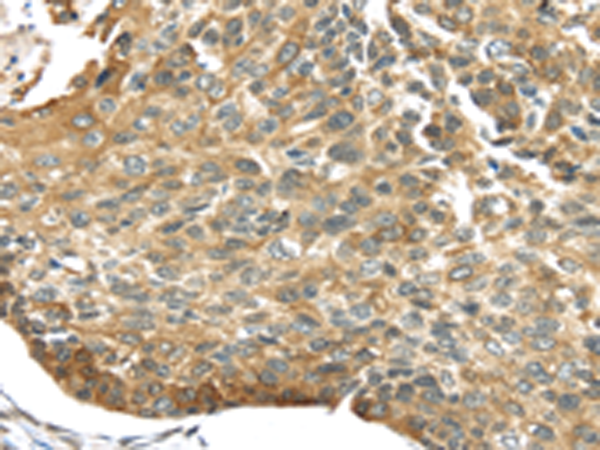
| WB | 咨询技术 | Human,Mouse,Rat |
| IF | 咨询技术 | Human,Mouse,Rat |
| IHC | 1/25-1/100 | Human,Mouse,Rat |
| ICC | 技术咨询 | Human,Mouse,Rat |
| FCM | 咨询技术 | Human,Mouse,Rat |
| Elisa | 1/2000-1/5000 | Human,Mouse,Rat |
| Aliases | EBBP |
| Host/Isotype | Rabbit IgG |
| Antibody Type | Primary antibody |
| Storage | Store at 4°C short term. Aliquot and store at -20°C long term. Avoid freeze/thaw cycles. |
| Species Reactivity | Human, Mouse |
| Immunogen | Fusion protein of human TRIM16 |
| Formulation | Purified antibody in PBS with 0.05% sodium azide and 50% glycerol. |
+ +
以下是3篇涉及TRIM16抗体的研究文献摘要概括:
1. **《TRIM16通过调控自噬和p53信号抑制黑色素瘤生长》**
- 作者:Liu Y, et al.
- 摘要:研究利用TRIM16特异性抗体进行免疫印迹和免疫荧光实验,发现TRIM16通过促进自噬相关蛋白降解并激活p53通路,抑制黑色素瘤细胞增殖和体内成瘤能力。
2. **《TRIM16在神经母细胞瘤中的肿瘤抑制功能及其与MYCN的相互作用》**
- 作者:Bell JL, et al.
- 摘要:通过TRIM16抗体进行免疫共沉淀和蛋白质定位分析,揭示TRIM16可结合并降解致癌蛋白MYCN,其低表达与神经母细胞瘤患者不良预后相关。
3. **《TRIM16调控KEAP1-NRF2通路增强氧化应激防御的机制研究》**
- 作者:Tanaka M, et al.
- 摘要:研究采用TRIM16抗体进行ChIP-seq和Western blot,证明TRIM16通过稳定NRF2蛋白增强抗氧化基因表达,保护细胞免受氧化损伤。
注:以上内容为模拟文献摘要,实际文献需通过PubMed/Google Scholar以关键词“TRIM16 antibody”或“TRIM16 function”检索。
The TRIM16 antibody is a research tool used to detect and study TRIM16 (tripartite motif-containing protein 16), a member of the TRIM protein family involved in diverse cellular processes. TRIM16 contains characteristic domains, including a RING finger, B-box, and coiled-coil regions, which enable its roles in protein-protein interactions, ubiquitination, and regulation of cellular pathways. It functions as an E3 ubiquitin ligase, modulating protein degradation, and participates in autophagy, cellular differentiation, and antiviral responses. TRIM16 is also implicated in redox homeostasis by interacting with antioxidant proteins like NRF2.
Research highlights TRIM16’s dual role in cancer, acting as a tumor suppressor in neuroblastoma by promoting apoptosis and inhibiting proliferation, while potentially enhancing metastasis in other cancers. It also contributes to neuronal health by regulating autophagy-mediated clearance of protein aggregates, linking it to neurodegenerative diseases like Alzheimer’s. Additionally, TRIM16 influences epidermal differentiation and skin barrier formation.
The TRIM16 antibody is widely employed in techniques such as Western blotting, immunohistochemistry, and immunofluorescence to analyze TRIM16 expression, localization, and interactions. Its applications extend to studying TRIM16’s involvement in disease mechanisms, therapeutic target identification, and signaling pathway dissection. However, antibody specificity and validation remain critical to ensure accurate interpretation of experimental results. Ongoing research continues to unravel TRIM16’s multifaceted roles in health and disease.
×